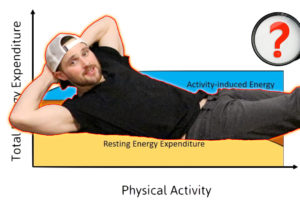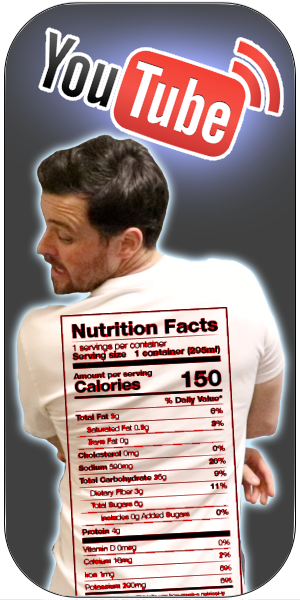How To Make Your Resting Energy Work For You
Trying to figure it out? Me Too! Just like you, for the majority of my life I’ve consumed my information about health, diet and exercise from school, friends, and the untamed land of internet headlines.
Low FAT!
Lift Weights!
More Protein!
Cardio is Key!
Low Carbs!
Big Breakfast!
No Breakfast!
And with each piece of new information, there we went again, blindly adjusting our habits. Why would anyone lie? And throughout all these years, a recurring theme stood at the forefront of it all: To get healthy, fit, and watch the fat melt away, you had to manage your calories in and calories out, I don’t know about you, but following that advice (loosely) for 10 years didn’t seem to do the trick.
Balanced Energy – It’s Physics Right?
Energy-In and Energy-Out can be further described as Energy Intake (aka food/calorie consumption) and Energy Expenditure (what we burn). And when the running average of these two variables cancel out, weight is maintained.
Easy! Right?
The Problem? We’re all not playing from the same deck of cards, or for that matter even the same game. Each and every one of us is in a unique situation, we have specific goals and face personalized challenges. Ones conversation of health typically doesn’t lead with “I’m joining this gym, or embarking this diet to Get Healthy“, instead it’s usually more along the lines of “I need to lose 12 pounds!” OR “I gotta look shredded for this toga party in a month” – a story for another day.
Think of it this way, you can consciously alter the amount (and type) of food that you consume, but you have no direct control of how your body metabolizes it, stores it, and alerts you that it needs more/less. That’s a bio-chemistry game, and our jobs as players is to: 1) Understand it and 2) manipulate it to achieve our goals. All while taking into account genetic predispositions, gene expression, epigenetics, gut bacteria, the hedonic (reward) pathway and environmental factors.
Still Easy?
I don’t think we’re playing cards anymore, maybe a 100,000 piece jigsaw puzzle. Change doesn’t happen overnight, it happens over many nights, so don’t worry! Small steps, day-by-day is the true definition of progress, and it starts by understanding the game you’re playing. So we’ll look at this one piece at a time. First, the three main ways we burn energy:
Resting Energy Expenditure (REE) – What we burn at Rest (Sleeping, Relaxing, Netflix)
Diet Induced Energy Expenditure (DEE) – The energy it takes to breakdown the Food we Eat
Activity Energy Expenditure (AEE) – Physical activity or activity-induced (aka a Workout)
Here’s the kicker, the majority of the energy we burn (daily) happens at rest (REE), in-fact 60-70%, while 20-30% is a result of physical activity (AEE) and 10% is credited to digestion (DEE). All this varies throughout a single day and are a function of body size, composition, age and gender. Unfortunately the only real way to measure ones exact Energy Expenditure is by spending some time in a respiration chamber (meaning you’ll have to cancel girls night), as you could imagine, this is not a viable option for most. So the quick and dirty way is to use a calculator like THIS one, it’s not perfect, but if you input the information honestly you’ll get a good look at what your expenditure may look like.
Pumpin Up REE
When it comes down to brass tacks (I always though it was brass tax but apparently not), no matter how many times you scan into the gym a day, physical activity will never take over a majority stake in you energy expenditure equation. The monster we want to tame is REE (Resting Energy Expenditure).
There is one thing you should be reminded upfront, our bodies are survival machines, they like to store energy (as fat) for rainy days, it fights to maintain it’s energy balance, and will try and counteract any drastic intervention we throw at it. If you were to go on a calorie restriction, it would respond by decreasing your REE in an effort to maintain balance (and making you feel like shit in the process). So if you want to boost REE, NOT Eating is not the stragety you want to go with.
Exercise is the intervention that will make the biggest impact on your REE, for this (extremely over-simplified) reason, exercise builds muscle, more muscle means more (and healthier) mitochondria (or the energy burning power-stations in our cells), thus increasing our energy requirements at rest. It also begins to alter our biochemistry for the better, but to reap these benefits you need to be consistent, according to studies, three times a week consistent.
Wanna over-achieve? I know you do!
Add the nutritional component, meal type and timing both play a role. Unless fasting, you should opt-in for breakfast, one high in protein would be ideal. Protein is the macronutrient that takes the most energy for out bodies to break down, and who can forget its esteemed title of being the building block of muscle. Double Wammy! Eating in the morning will flip our bodies metabolic switch from energy conservation to full steam ahead. However, there’s one catch, Dinner! Or to be specific, the after-dinner snack(s). Plan to be done with your meals about four hours before hitting the hay, the later you snack the less time you have to burn that energy, and if you can’t burn it, ya store it!
Oh Yeah, Eat Real Foods! Remember, if it has a nutrition label, by definition it’s processed. Real food, food with fiber and no added sugar will help normalize Leptin, Glucose and Insulin levels, ensuring that the satiety (or I’m Full) signals are being sent/received by the brain (the hypothalamus). In addition to food and exercise, a synced Circadian Clock and sufficient sleep play an important role as well.
As you alter your habits, you may start to see a physical change, this is a result of an alteration in your internal biochemical processes. Energy Storage, Hormone secretion, Neuron activity, all operating under new management, with employee satisfaction at an all time high. Biochemistry likely got you there, and in most cases biochemistry can bring ya back! Each and every day is an opportunity to build equity in your health and longevity, to put yourself in a position to feel great, look great and prosper.
Ya Get Out, What Ya Put In.






